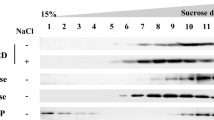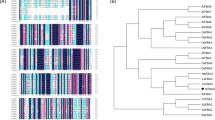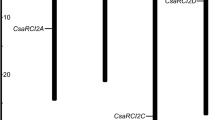Abstract
Winter survival develops efficient tolerance mechanisms in plants by regulating cold-responsive and cold-regulated genes at the transcriptional level. Hence, an insight into the expression would provide the molecular function of these cold responsive genes. In this study, an uncharacterized gene encoding a cold-regulated (Cor413) protein identified from Saccharum spontaneum (wild relative species of sugarcane) low-temperature transcriptome with environmental adaptability is isolated and characterized. The full-length coding region possesses an open reading frame of 642 bp, which encodes a putative polypeptide of 213 amino acids of molecular weight 25.6 kDa and an isoelectric point (Pi) of 9.69. The SsCor413 sequence showed a high similarity to monocot Cor413 proteins comprising a WCOR413 domain. Bioinformatics analysis revealed that Cor413 protein has multispanning transmembrane helices along with highly conserved phosphorylation sites. String analysis suggested that SsCor413 is grouped with LEA and Rab proteins that are involved in freezing tolerance. Gene ontology analysis assigned the protein to terms such as “plasma membrane,” “cold acclimation,” and “response to cold.” Sub-cellular localization experiments of sugarcane callus and onion epidermal cells indicated the nuclear localized expression. Quantitative gene expression analysis indicated that the SsCor413 gene is up-regulated in leaf and root tissues of S. spontaneum under low temperature, salinity, and water deficit stress conditions. These results highlight the potential role of SsCor413 in abiotic stress tolerance, and this gene could be a new candidate for combating multiple stresses in sugarcane.










Similar content being viewed by others
Abbreviations
- Cor:
-
Cold regulated
ORF
Open reading frame
GFP
Green Fluorescent Protein
LEA
Late Embryogenic Abundant Protein
GO
Gene Ontology
LT
Low temperature
MS
Murashige and Skoog
References
Altschul SF, Gish W, Miller W, Myers EW, Lipman DJ (1990) Basic local alignment search tool. J Mol Biol 215:403–410. https://doi.org/10.1016/S0022-2836(05)80360-2
Amalraj VA, Rakkiyappan P, Neelamathi D, Chinnaraj S, Subramanian S (2008) Wild cane as a renewable source for fuel and fiber in paper industry. Curr Sci 95:1599–1602 https://www.jstor.org/stable/24105519
Augustine SM, Cherian AV, Syamaladevi DP, Subramonian N (2015) Erianthus arundinaceus HSP70 (EaHSP70) acts as a key regulator in the formation of anisotropic interdigitation in sugarcane (Saccharum spp. hybrid) in response to drought stress. Plant Cell Physiol 56(12):2368–2380. https://doi.org/10.1093/pcp/pcv142
Baker SS, Wilhelm KS, Thomashow MF (1994) The 5′-region of Arabidopsis thaliana Cor15a has cis-acting elements that confer cold, drought and ABA-regulated gene expression. Plant Mol Biol 24:701–713. https://doi.org/10.1007/BF00029852
Blom N, Gammeltoft S, Brunak S (1999) Sequence and structure-based prediction of eukaryotic protein phosphorylation sites. J Mol Biol 294:1351–1362. https://doi.org/10.1006/jmbi.1999.3310
Breton G, Danyluk J, Charron JB, Sarhan F (2003) Expression profiling and bioinformatic analyses of a novel stress regulated multispanning transmembrane protein family from cereals and Arabidopsis. Plant Physiol 132:64–74. https://doi.org/10.1104/pp.102.015255
Chinnusamy V, Zhu J, Zhu JK (2006) Gene regulation during cold acclimation in plants. Physiol Plant 126:52–61. https://doi.org/10.1111/j.1399-3054.2006.00596.x
Chinnusamy V, Zhu J, Zhu JK (2007) Cold stress regulation of gene expression in plants. Trends Plant Sci 12:444–451. https://doi.org/10.1016/j.tplants.2007.07.002
Dharshini S, Chakravarthi M, Manoj VM, Naveenarani M, Kumar R, Meena M, Appunu C (2016) De novo sequencing and transcriptome analysis of a low temperature tolerant Saccharum spontaneum clone IND 00-1037. J Biotech 231:280–294. https://doi.org/10.1016/j.jbiotec.2016.05.036
Dharshini S, Chakravarthi M, Vignesh D, Nerkar G, Ashwin Narayan J, Manoj VM, Naveenarani M et al (2018) Differential gene expression profiling through transcriptome approach of Saccharum spontaneum L. under low temperature stress reveals genes potentially involved in cold acclimation. 3 Biotech 8(4):195. https://doi.org/10.1007/s13205-018-1194-2
Felsenstein J (1985) Confidence limits on phylogenies: an approach using the bootstrap. Evolution 39:783–791. https://doi.org/10.1111/j.1558-5646.1985.tb00420.x
Fitter AH, Hay RKM (1981) Environmental physiology of plants. Academic Press, New York
Friesen PC, Peixoto MM, Busch FA, Johnson DC, Sage RF (2014) Chilling and frost tolerance in Miscanthus and Saccharum genotypes bred for cool temperate climates. J Exp Biol 65(13):3749–3758. https://doi.org/10.1093/jxb/eru105
Garsmeur O, Droc G, Antonise R, Grimwood J, Potier B, Aitken K, Jenkins J, Martin G, Charron C, Hervouet C, Costet L (2018) A mosaic monoploid reference sequence for the highly complex genome of sugarcane. Nat Commun 9(1):2638. https://doi.org/10.1038/s41467-018-05051-5
Gasteiger E, Hoogland C, Gattiker A, Duvaud S, Wilkins MR, Appel RD, Bairoch A (2005) Protein identification and analysis tools on the ExPASy server. In: Walker JM (ed) The proteomics protocols handbook. Humana Press, Totowa, pp 71–607
Guermeur Y, Elisseeff A, Paugam-Moisy H (1999) Estimating the sample complexity of a multi-class discriminant model. In artificial neural networks, ICANN 99. Ninth international conference on (Conf. Publ. No. 470) (Vol. 1, pp. 310-315). IET
Guruprasad K, Reddy BVP, Pandit MW (1990) Correlation between stability of a protein and its dipeptide composition: a novel approach for predicting in vivo stability of a protein from its primary sequence. Protein Eng 4:155–164. https://doi.org/10.1093/protein/4.2.155
Guy CL (1990) Cold acclimation and freezing stress tolerance: role of protein metabolism. Annu Rev Plant Biol 41(1):187–223. https://doi.org/10.1146/annurev.pp.41.060190.001155
Houde M, Dhindsa RS, Sarhan F (1992) A molecular marker to select for freezing tolerance in Gramineae. Mol Gen Genet 243:43–48. https://doi.org/10.1007/BF00272343
Ikai AJ (1980) Thermo stability and aliphatic index of globular proteins. J Biochem 88:1895–1898. https://doi.org/10.1093/oxfordjournals.jbchem.a133168
Kalendar R, Khassenov B, Ramanculov E, Samuilova O, Ivanov KI (2017) FastPCR: an in silico tool for fast primer and probe design and advanced sequence analysis. Genomics. 109:312–319. https://doi.org/10.1016/j.ygeno.2017.05.005
King BR, Guda C (2007) ngLOC: an n-gram-based Bayesian method for estimating the subcellular proteomes of eukaryotes. Genome Biol 8(5):R68. https://doi.org/10.1186/gb-2007-8-5-r68
Krogh A, Larsson B, von Heijne G, Sonnhammer EL (2001) Predicting transmembrane protein topology with a hidden Markov model: application to complete genomes. J Mol Biol 305:567–580. https://doi.org/10.1006/jmbi.2000.4315
Kumar S, Stecher G, Tamura K (2016) MEGA7: molecular evolutionary genetics analysis version 7.0 for bigger datasets. Mol Biol Evol 33(7):1870–1874. https://doi.org/10.1093/molbev/msw054
Kyte J, Doolottle RF (1982) A simple method for displaying the hydropathic character of a protein. J Mol Biol 157:105–132. https://doi.org/10.1016/0022-2836(82)90515-0
Letunic I, Doerks T, Bork P (2014) SMART: recent updates, new developments and status in 2015. Nucleic Acids Res 43(D1):D257–D260. https://doi.org/10.1093/nar/gku949
Livak KJ, Schmittgen TD (2001) Analysis of relative gene expression data using real-time quantitative PCR and the 2−ΔΔCT method. Methods 25(4):402–408. https://doi.org/10.1006/meth.2001.1262
Ma X, Wang G, Zhao W, Yang M, Ma N, Kong F, Dong X, Meng Q (2017) SlCOR413IM1: a novel cold-regulation gene from tomato, enhances drought stress tolerance in tobacco. J Plant Physiol 216:88–99. https://doi.org/10.1016/j.jplph.2017.03.016
McGuffin LJ, Bryson K, Jones DT (2000) The PSIPRED protein structure prediction server. Bioinformatics 16(4):404–405. https://doi.org/10.1093/bioinformatics/16.4.404
Nei M, Kumar S (2000) Molecular evolution and phylogenetics. Oxford University Press, New York
Nielsen H, Krogh A (1998) Prediction of signal peptides and signal anchors by a hidden Markov model. In: Glasgow J, Littlejohn T, Major F, Lathrop R, Sankoff D, Sensen C (eds) Proceedings of the sixth international conference on intelligent Systems for Molecular Biology. AAAI Press, Menlo Park, pp 122–130
Palaniswamy H, Syamaladevi DP, Mohan C, Philip A, Petchiyappan A, Narayanan S (2016) Vacuolar targeting of r-proteins in sugarcane leads to higher levels of purifiable commercially equivalent recombinant proteins in cane juice. Plant Biotechnol J 14(2):791–807. https://doi.org/10.1111/pbi.12430
Premachandran MN, Sobhakumari VP, Lekshmi M, Viola VR (2017) Genome characterization of in vitro induced amphiploids of an intergeneric hybrid Erianthus arundinaceus × Saccharum spontaneum. Sugar Tech 19(4):386–393. https://doi.org/10.1007/s12355-016-0482-6
Puhakainen T, Hess MW, Makela P, Svensson J, Heino P, Palva ET (2004) Overexpression of multiple dehydrin genes enhances tolerance to freezing stress in Arabidopsis. Plant Mol Biol 54:743–753. https://doi.org/10.1023/B:PLAN.0000040903.66496.a4
Qu Y, Zhou A, Zhang X, Tang H, Liang M, Han H, Zuo Y (2015) De novo transcriptome sequencing of low temperature-treated Phlox subulata and analysis of the genes involved in cold stress. Int J Mol Sci 16:9732–9748. https://doi.org/10.3390/ijms16059732
Sarhan F, Danyluk J (1998) Engineering cold-tolerant crops-throwing the master switch. Trends. Plant Sci 3:289–290. https://doi.org/10.1016/S1360-1385(98)01285-0
Schultz J, Milpetz F, Bork P, Ponting CP (1998) SMART, a simple modular architecture research tool: identification of signaling domains. Proc Natl Acad Sci U S A 95(11):5857–5864. https://doi.org/10.1073/pnas.95.11.5857
Shimada TL, Shimada T, Takahashi H, Fukao Y, Hara-Nishimura I (2008) A novel role for oleosins in freezing tolerance of oilseeds in Arabidopsis thaliana. Plant J 55:798–809. https://doi.org/10.1111/j.1365-313X.2008.03553.x
Shivalingamurthy SG, Anangi R, Kalaipandian S, Glassop D, King GF, Rae AL (2018) Identification and functional characterization of sugarcane invertase inhibitor (ShINH1): a potential candidate for reducing pre-and post-harvest loss of sucrose in sugarcane. Front Plant Sci 9. https://doi.org/10.3389/fpls.2018.00598
Somerville C (1995) Direct tests of the role of membrane lipid composition in low-temperature-induced photoinhibition and chilling sensitivity in plants and cyanobacteria. Proc Natl Acad Sci USA 92(14):6215 PMCID: PMC41488
Sun T, Liu F, Wang W, Wang L, Wang Z, Li J, Que Y, Xu L, Su Y (2018) The role of sugarcane catalase gene ScCAT2 in the defense response to pathogen challenge and adversity stress. Int J Mol Sci 19(9):2686. https://doi.org/10.3390/ijms19092686
Thomashow MF (1998) Role of cold-responsive genes in plant freezing tolerance. Plant Physiol 118:1–8. https://doi.org/10.1104/pp.118.1.1
Thompson JD, Gibson TJ, Plewniak F, Jeanmougin F, Higgins DG (1997) The CLUSTAL_X windows interface: flexible strategies for multiple sequence alignment aided by quality analysis tools. Nucleic Acids Res 25:4876–4882. https://doi.org/10.1093/nar/25.24.4876
Wang J, Zuo KJ, Qin J, Zhang L, Su L, Liu J, Tang KX (2007) Isolation and bioinformatics analyses of a COR413-like gene from Gossypium barbadense. Acta Physiol Plant 29(1):1–9. https://doi.org/10.1007/s11738-006-0001-6
Xu D, Farmer A, Chook YM (2010) Recognition of nuclear targeting signals by Karyopherin-β proteins. Curr Opin Struct Biol 20:782–790. https://doi.org/10.1016/j.sbi.2010.09.008
Xue GP (2002) Characterization of the DNA-binding profile of barley HvCBF1 using an enzymatic method for rapid, quantitative and high throughput analysis of the DNA-binding activity. Nucleic Acids Res 30:e77. https://doi.org/10.1093/nar/gnf076
Zhao P, Liu P, Yuan G, Jia J, Li X, Qi D, Chen S, Ma T, Liu G, Cheng L (2016) New insights on drought stress response by global investigation of gene expression changes in sheepgrass (Leymus chinensis). Front Plant Sci 7:954. https://doi.org/10.3389/fpls.2016.00954
Zhou A, Sun H, Feng S, Zhou M, Gong S, Wang J, Zhang S (2018) A novel cold-regulated gene from Phlox subulata, PsCor413im1, enhances low temperature tolerance in Arabidopsis. Biochem Biophys Res Commun 495(2):1688–1694. https://doi.org/10.1016/j.bbrc.2017.12.042
Acknowledgments
The authors would like to thank ICAR—Sugarcane Breeding Institute, Coimbatore for providing the necessary infrastructure. We thank Dr. Shobakumari, ICAR-SBI for extending microscope facility. We greatly acknowledge Dr. K. Kadirvelu, DRDO-BU, Coimbatore to access the fluorescence microscope. Thanks to Mr. K. Selvamuthu for his technical assistance to carry out the work.
Funding
The authors would like to thank Science and Engineering Research Board (SERB), Department of Science and Technology (DST), New Delhi (Grant No SB/YS/LS-165/2013) for financial support. Authors thank the Department of Science and Technology, India (DST-INSPIRE, IF150891) for financial support to DS.
Author information
Authors and Affiliations
Contributions
DS and AC designed the experiments. DS performed the experiments and wrote the manuscript. SGS provided localization control vectors, assisted in microscopic studies, and manuscript revision. MVM and ANJ supported in cloning. SPTS did the artwork for figs. RK and MRM helped in bioinformatics analysis. MM, BR, and AC revised the manuscript. All authors read and approved the final manuscript.
Corresponding author
Ethics declarations
Conflict of Interest
The authors declare that they have no conflict of interest.
Additional information
Publisher’s Note
Springer Nature remains neutral with regard to jurisdictional claims in published maps and institutional affiliations.
Key Message
Cor413 is identified as abiotic stress responsive gene in Saccharum spontaneum and acts as potential gene for combating abiotic stresses in sugarcane.
Electronic supplementary material
ESM 1
(DOC 392 kb)
Rights and permissions
About this article
Cite this article
Dharshini, S., Manoj, V.M., Suresha, G.S. et al. Isolation and Characterization of Nuclear Localized Abiotic Stress Responsive Cold Regulated Gene 413 (SsCor413) from Saccharum spontaneum. Plant Mol Biol Rep 38, 628–640 (2020). https://doi.org/10.1007/s11105-020-01224-z
Published:
Issue Date:
DOI: https://doi.org/10.1007/s11105-020-01224-z




